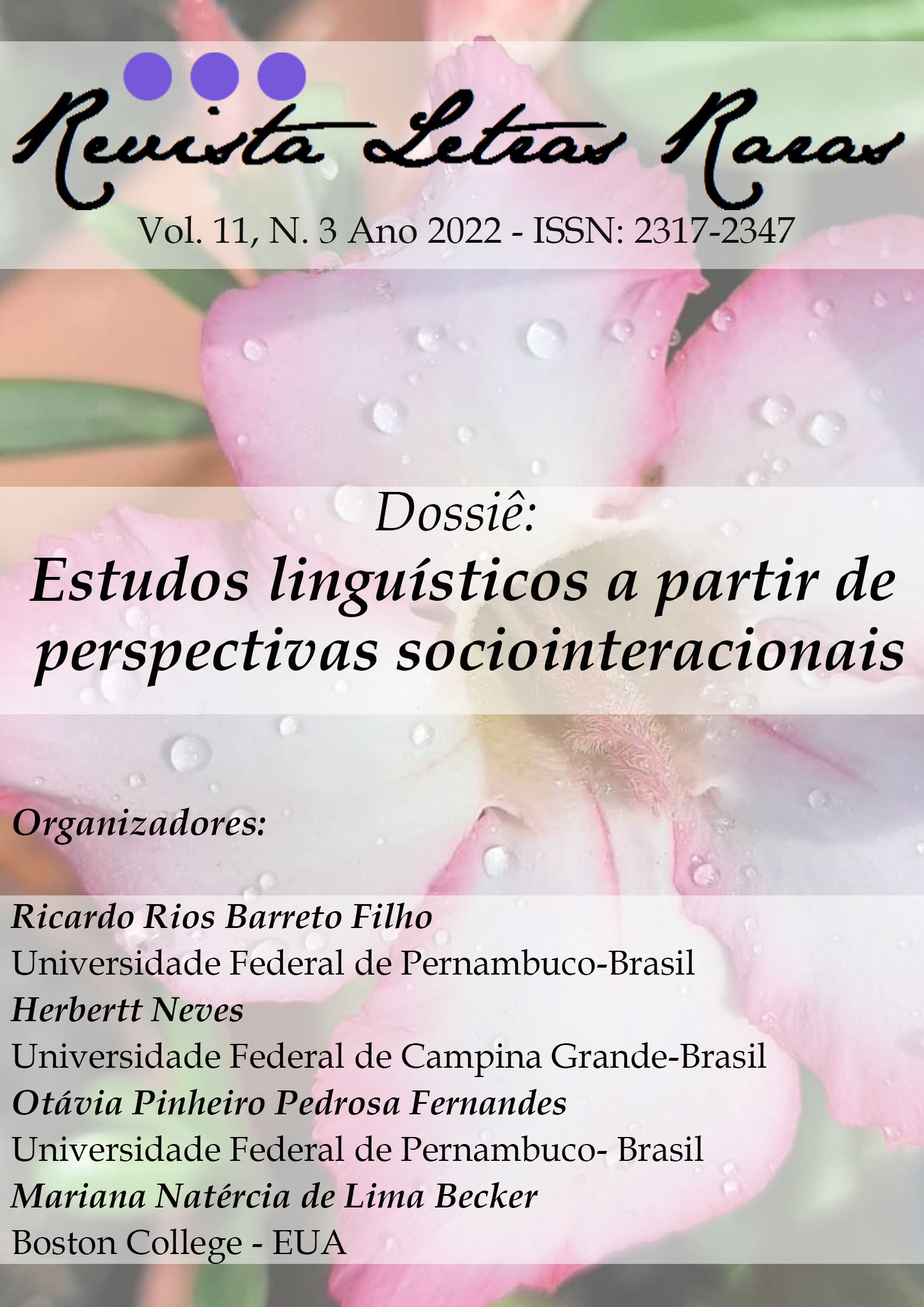Language, racism, power and carnivalization: a dialogic analysis of cartoons
DOI:
https://doi.org/10.5281/zenodo.8152605Palavras-chave:
Language, Power, Carnivalization, Racism, CartoonsResumo
This study aims to investigate language from a dialogical perspective, as an ideological phenomenon, as a social product and its relationship with those who hold power in social institutions, as it is conditioned by social organizations, which use it to fulfill their socio-ideological interests, presenting an order considered stable by society. We seek to show how some of these interests are questioned and how a new order in the cartoon genre is proposed based on carnivalesque language, which encourages the reader to reflect about its reality. Therefore, 02 cartoons were chosen at random, but which have in common the denunciations of social and racial injustices. We use notions from dialogic theory such as language, context, ideology, dialogic relations, enunciation and carnivalization. The analysis shows that the use of carnivalization makes evident the racism present in society, power relations and, at the same time, the injustices committed by those who hold power in society against minorities, prompting the reader to reflect about these issues and to stand for them.
Downloads
Referências
ALAVARCE, Camila da Silva. A ironia e suas refrações: um estudo sobre a dissonância na paródia e no riso. São Paulo: Cultura Acadêmica, 2009.
ALMEIDA, J. M; OLIVEIRA, A. M. o poder da palavra: Linguagem, Ideologia e Educação. Revista Húmus. v. 6, n. 16, 2016. Disponível em: http://www.periodicoseletronicos.ufma.br/index.php/revistahumus/article/view/4671#:~:text=A%20palavra%20pode%20ter%20diversos,a%20constru%C3%A7%C3%A3o%20da%20exist%C3%AAncia%20humana.
ALMEIDA, S. Racismo estrutural. São Paulo: Sueli Carneiro; Pólen, 2019.
BAKHTIN, M. Teoria do romance I: a estilística. São Paulo: Editora 34, 2015 [1934-1935].
BAKHTIN, M. A cultura popular na Idade Média: o contexto de François Rabelais. São Paulo: Hucitec, 2010 [1945].
BAKHTIN, M. Problemas da poética de Dostoiévski. Rio de Janeiro: Forense Universitária, 2018 [1963].
BAKHTIN, M. Os gêneros do discurso. São Paulo: Editora 34, 2016 [1979].
BRAIT, B. Ironia em perspectiva polifônica. 2ª ed. Campina: Unicamp, 2008.
BRAIT, Beth. A palavra mandioca do verbal ao verbo-visual. Bakhtiniana, São Paulo, v.1, n.1, p.142-160, 1º sem. 2009.
BRAIT, Beth. Olhar e ler: verbo-visualidade em perspectiva dialógica. Bakhtiniana, São Paulo, 8 (2): 43-66, Jul./Dez. 2013.
CALAZANS, Janaina de Holanda Costa. O gênero das últimas questões: os quadrinhos de Mafalda e a menipeia. 2021. Tese (Doutorado em Ciências da Linguagem). Universidade Católica de Pernambuco, Recife, 2021.
CUNHA, D. A. C. Vozes e poder no telejornal: o funcionamento do discurso reportado no jornal nacional da rede globo. Linha D'Água (Online), São Paulo, v. 30, n. 1, p. 89-114, jun. 2017. http://www.revistas.usp.br/linhadagua/article/view/128319/133040.
CUNHA, D. A. C. Linguagem, diálogo, ponto de vista, interpretação: uma leitura de artigos de opinião. In: BRAIT, Beth; PISTORI, Maria Helena Cruz; FRANCELINO, Pedro Farias (orgs.). Linguagem e conhecimento (Bakhtin, Volóchinov, Medviédev). Campinas: Pontes Editores, 2019a. p.153-181.
CUNHA, D. A. C. O outro no discurso: representação e circulação. In: DE PAULA L. e STAFUZZA G. Círculo de Bakhtin: concepções em construção. Campinas: Mercado de Letras, 2019b. p.53-78.
DIONÍSIO, A. P. Gêneros multimodais e multiletramento. In: KARWOSKI, A. M.; GAYDECZKA, B.; & BRITO, K. S. (Orgs.). Gêneros textuais: reflexões e ensino. Rio de Janeiro: Lucerna, 2006.
MAUAD, A. M. Fotografia e história: possibilidade de análise. In: CIAVATTA, M. & ALVES, Nilda (org.). A leitura de imagens na pesquisa social: história, comunicação e educação. São Paulo:Cortez, 2004.
SOUZA, J. A elite do atraso: da escravidão a Bolsonaro. Rio de Janeiro: Estação Brasil, 2019.
VOLOCHINOV, V. N. Marxismo e filosofia da linguagem. Problemas fundamentais do método sociológico na ciência da linguagem. Tradução, notas e glossário Sheila Grillo e Ekaterina, Vólkova Américo. São Paulo, Editora 34, 2017 [1929].
VOLOCHINOV, V. A palavra na vida e a palavra na poesia: ensaios, artigos, resenhas e poemas. Org., trad., ensaio introdutório e notas de Sheilla Grillo e Ekaterina Vólkova Américo – São Paulo: Editora 34, 2019 [1930].
Downloads
Publicado
Como Citar
Edição
Seção
Licença
Copyright (c) 2023 Revista Letras Raras

Este trabalho está licenciado sob uma licença Creative Commons Attribution-NonCommercial 4.0 International License.







